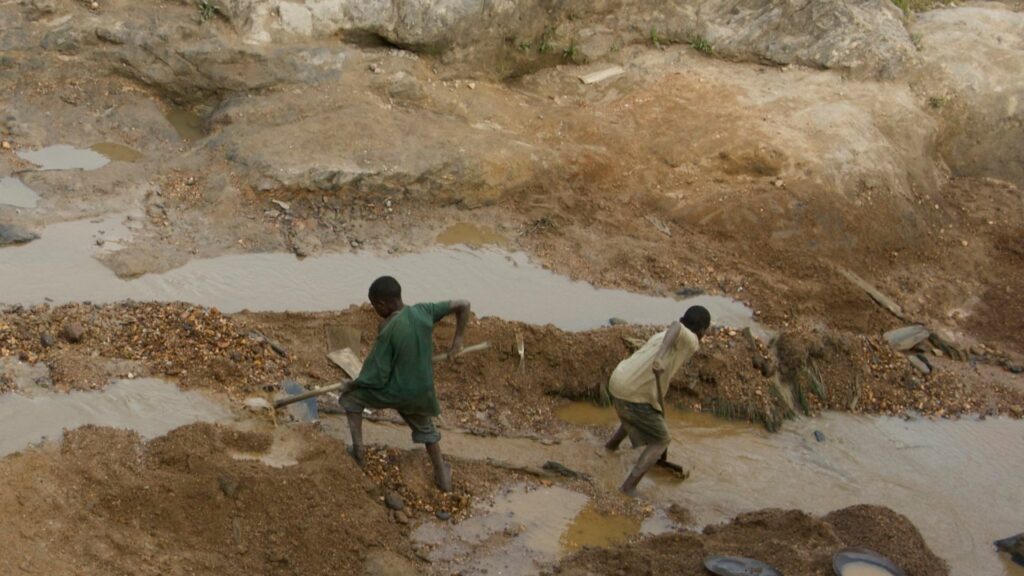A joint venture created by a new partnership between the Democratic Republic of Congo (DRC) and the United Arab Emirates (UAE) with a view to ending the illicit movement of precious metals from the DRC has just made its shipment of "fair gold".
The 28 kilograms of gold bars, displayed at a ceremony in Kinshasa on Friday 13 January, resulted from the first five days of activity by Primera Gold DRC in the east of the country, the company's director, Joseph Kazibaziba said. That initial shipment was more than the 26 kilograms of artisanal gold officially exported by the DRC in 2021.
Primera Gold is one of two companies created under a partnership contract signed on 10 December by the DRC and UAE. The other is Primera Metals DRC, which will focus on the tin, tungsten and tantalium sectors. The objective of the partnership is to stop smuggling in both sectors, according to Congolese officials.
New company aims to ship one tonne of "certified" gold per month
Primera Gold's goal is to ship about one tonne of "certified" gold per month and eventually reach about 15 tonnes a year. About 30,000 artisanal miners will supply gold to the company, which promises to provide them with “a regular income and access to health care and education for their families.”
Eastern Congo is rich in minerals of all kinds, which, instead of benefitting the country and its people, feed smuggling and armed groups and “are the cause of our misery,” Congolese President Felix Tshisekedi said at Friday’s ceremony.
Artisanal miners produce an estimated 20 tonnes of gold each year, but the bulk of it is smuggled to neighbouring Burundi, Rwanda and Uganda, before ending up on international markets. Moreover, rebel groups in eastern DRC often force miners to pay for permission to mine the gold, in addition to raiding mines, trading in gold themselves, and using part of the proceeds to procure arms.
Forged certificates
While some Belgian businesses are involved in the DRC's gold industry, much of the smuggled gold ends up in the UAE.
Companies trading in Congolese gold are required to certify that it does not come from regions where the mining and sale of the commodity benefits rebel groups. However, certificates are easily forged, and trading companies have few mechanisms for tracing the gold back to its source, according to a report carried on 27 November in the African Defense Forum (ADF), a quarterly magazine published by the US Africa Command.
Related News
- EU sanctions Belgian for dirty gold from DRC
- EU funding of Rwandan military called into question amid DRC violence
The illicit trade in Congolese gold has come under increasing scrutiny in recent years, especially since a 2020 UN report exposing the links between illicit gold mining and trade, on one hand, and the activities of rebel groups in the east of the DRC, on the other. According to the UN, only 60 out of about 1500 gold mines were certified conflict free.
In recent months, businesses that profit from the illegal trade have come under fire internationally, including the African Gold Refinery (AGR) in Uganda, and its beneficial owner and former director, Belgian gold trader Alain Goetz.
Belgian gold trader comes under fire
On 17 March 2022, the US Office of Foreign Assets Control (OFAC), a subdivision of the Department of Treasury, issued sanctions against Goetz, the AGR and a network of companies involved in the trade, noting that the "illicit movement of gold provides revenue to armed groups that threaten the peace, security and stability of the DRC."
On 8 December, the European Union also announced sanctions on Goetz for his involvement in the illicit trade, much to the relief of watchdog groups such as The Sentry, an investigative and policy organisation that seeks to disable networks that benefit from violent conflict and other abuses.
The EU sanctions against Goetz “are a strong measure to help halt exploitation of the conflict” in the DRC, said Sasha Lezhnev, policy consultant at the Sentry commented in the wake of the EU’s move. “There’s finally a cost to trading conflict gold.”

